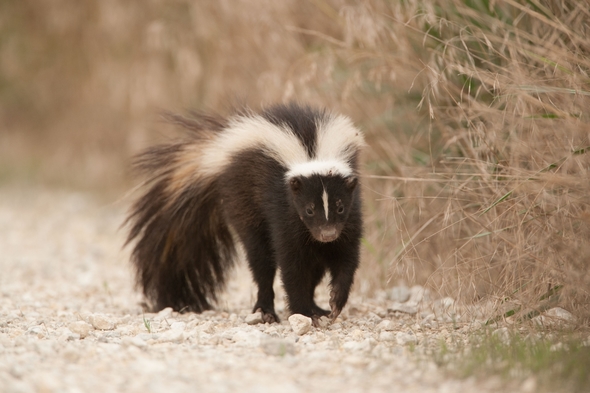West Plains, MO. – The fourth confirmed case of rabies has been reported to the Howell County Health Department by the Missouri State Public Health Lab in Jefferson City. The case involved a rabid skunk near Christopher Street in the West Plains city limits. The skunk was killed by a family dog in the area. The dog had current rabies vaccinations, and received rabies boosters and was placed under a 45-day home quarantine.
Justin Frazier, Environmental Public Health Supervisor with the Howell County Health Department said, “Due to the pet owners in this case being diligent on keeping their pet up to date on their vaccinations, we were able to avoid having to euthanize them or quarantine them for 6 months at a vet facility at the owner’s expense as a result of the rabies exposure. It is very important for people to protect themselves against rabies by not handling any pet that has been exposed to a wild animal until that animal can be tested to see if it is carrying the rabies virus.” Frazier stated, “It is never enjoyable to have to recommend that an individual receive a series of rabies shots or to require the euthanization of family pets. Unfortunately, rabies is a fatal disease, and as a result, exposed individuals must NOT take a “wait and see” approach, only seeking treatment once symptoms develop. It is extremely important for anyone that has been bitten by a domestic animal, had an exposure such as a bite or scratch from a wild animal or had contact with a pet that has been exposed to a wild animal to report the incident to the health department, as well as their physician, for a rabies risk assessment. The proper actions must be taken quickly following a possible exposure to protect individuals from the rabies virus.”
In 2008, a Texas county man died from rabies after being bitten on the ear by a bat and who failed to seek medical treatment following the bite. This was the first human rabies death in Missouri since 1959. Many Missourians receive the anti-rabies vaccine each year to prevent the development of rabies after experiencing a possible exposure to a rabid animal. The Centers for Disease Control and Prevention (CDC) estimates that 40,000 persons in the United States receive the anti-rabies series of shots annually.
Although rabies is transmitted to humans almost entirely through bites from rabid animals, contamination of open wounds or mucous membranes with saliva or nervous tissue from a rabid animal could potentially constitute an exposure. It is important to remember that personal pets should not be handled without protection directly after being exposed to wildlife, due to the potential for exposure from residual saliva from an infected animal.






